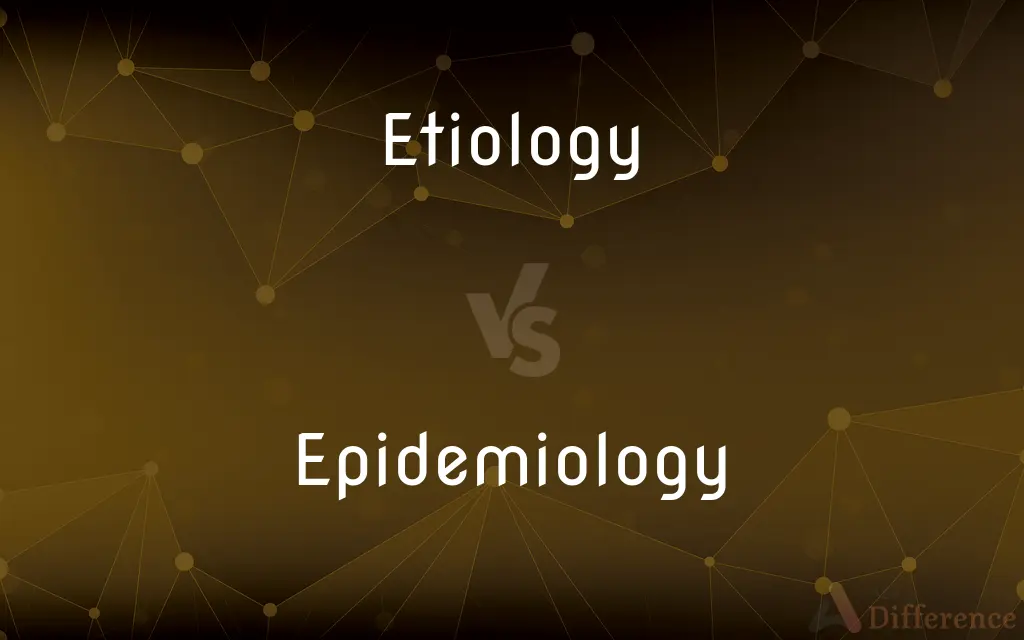Etiology vs. Epidemiology — What's the Difference?
By Tayyaba Rehman — Updated on October 16, 2023
Etiology studies the causes or origins of diseases, while epidemiology investigates the distribution, patterns, and determinants of health-related events in populations.

Difference Between Etiology and Epidemiology
Table of Contents
ADVERTISEMENT
Key Differences
Etiology and Epidemiology are vital disciplines in the study of diseases. Etiology delves into understanding the causes or origins of a disease. This field looks at the multiple factors that might trigger a medical condition, from genetic predispositions to environmental influences.
Epidemiology, on the other hand, focuses on how diseases spread and their prevalence in different populations. It seeks to understand patterns, causes, and effects of health conditions in specific groups. By doing so, epidemiology plays a crucial role in public health planning and interventions.
Within the realm of Etiology, researchers might explore why a particular cancer type occurs, considering both genetic mutations and external factors like exposure to certain chemicals or radiation. Their findings help in preventive measures and treatment development.
Epidemiology, in its scope, can reveal how a contagious disease is spreading within a community, allowing for timely responses and containment. This discipline is integral in guiding public health policies, especially in the event of outbreaks or pandemics.
In summary, while both Etiology and Epidemiology concentrate on diseases, etiology zeroes in on the 'why' and 'how' behind a disease's occurrence, and epidemiology delves into its distribution, patterns, and effects on populations.
ADVERTISEMENT
Comparison Chart
Definition
Study of causes or origins of diseases.
Study of distribution and determinants of health events in populations.
Primary Focus
Causes and factors leading to a disease.
Patterns, causes, and effects of diseases in groups.
Application
Understanding disease triggers for prevention and treatment.
Public health planning, outbreak response, and policy guidance.
Methodology
Delving into genetic, environmental, and biological factors.
Observational studies, statistics, and population assessments.
End Goal
Find the root cause of diseases.
Understand, control, and prevent disease outbreaks in communities.
Compare with Definitions
Etiology
The study of the causes of diseases.
The etiology of many cancers remains under investigation.
Epidemiology
The science of disease distribution and determinants in populations.
Epidemiology studies were crucial during the COVID-19 pandemic.
Etiology
A cause or set of causes for a disease or condition.
Multiple factors contribute to the etiology of heart diseases.
Epidemiology
The study of patterns, causes, and effects of health conditions in groups.
Epidemiology helps shape public health interventions.
Etiology
A branch of medicine that investigates the reasons behind pathological conditions.
Etiology aids in developing targeted treatments for diseases.
Epidemiology
The analysis of the distribution of health-related events.
Through epidemiology, researchers can track the spread of infectious diseases.
Etiology
The factors or events that precipitate a particular disease or condition.
The etiology of the outbreak was traced to contaminated water.
Epidemiology
A field that provides the foundation for public health decisions.
Epidemiology insights were used to create vaccination campaigns.
Etiology
Etiology (pronounced ; alternatively: aetiology or ætiology) is the study of causation or origination. The word is derived from the Greek αἰτιολογία (aitiología) "giving a reason for" (αἰτία, aitía, "cause"; and -λογία, -logía).
Epidemiology
The method used to find the causes of health outcomes and diseases in populations.
The epidemiology of the flu varies from year to year.
Etiology
The study of causes or origins.
Epidemiology
Epidemiology is the study and analysis of the distribution (who, when, and where), patterns and determinants of health and disease conditions in defined populations. It is a cornerstone of public health, and shapes policy decisions and evidence-based practice by identifying risk factors for disease and targets for preventive healthcare.
Etiology
The branch of medicine that deals with the causes or origins of disease.
Epidemiology
The branch of medicine which deals with the incidence, distribution, and possible control of diseases and other factors relating to health.
Etiology
Assignment of a cause, an origin, or a reason for something.
Epidemiology
The branch of medicine that deals with the study of the causes, distribution, and control of disease in populations.
Etiology
The cause or origin of a disease or disorder as determined by medical diagnosis.
Epidemiology
(sciences) The branch of science dealing with the spread and control of diseases, viruses, concepts etc. throughout populations or systems.
Etiology
Standard spelling of aetiology
Epidemiology
(sciences) The epidemiological body of knowledge about a particular thing.
Etiology
The science of causes. Same as tiology.
Epidemiology
That branch of medicine which studies the incidence and distribution of disease in a population, and uses such information to find the causes, modes of transmission, and methods for control of disease.
Etiology
The cause of a disease
Epidemiology
The branch of medical science dealing with the transmission and control of disease
Etiology
The philosophical study of causation
Etiology
The origin or causation of a disease or condition.
Genetic mutations play a role in the etiology of hereditary disorders.
Common Curiosities
Why is etiology important for medical research?
Etiology helps in understanding disease triggers, aiding in prevention and treatment development.
How does epidemiology track disease spread?
Epidemiology uses observational studies, statistics, and other methods to assess disease patterns in populations.
Can etiology include both genetic and environmental factors?
Yes, etiology considers all factors, including genetic, environmental, and biological, that can lead to diseases.
Can etiology determine a single cause for a disease?
Sometimes, but often diseases have multiple factors contributing to their etiology.
What is a significant contribution of epidemiology to global health?
Epidemiology has been instrumental in understanding and responding to global health crises, such as pandemics.
How do etiology and epidemiology work together?
While etiology identifies disease causes, epidemiology studies how these diseases affect populations, both aiding in public health decisions.
How has epidemiology evolved with technology?
With advanced technology, epidemiology now utilizes digital tools and big data for more precise disease tracking and analysis.
Can epidemiology predict future disease outbreaks?
While it can't always predict, epidemiology can identify risk factors and potential areas of concern for future outbreaks.
What does etiology study?
Etiology studies the causes or origins of diseases.
How does epidemiology benefit public health?
Epidemiology guides public health policies and interventions by understanding disease distribution in populations.
What tools does epidemiology often use?
Epidemiology uses surveys, databases, statistics, and observational studies to gather and analyze data.
Are there overlaps in the studies of etiology and epidemiology?
Yes, while they have distinct focuses, both disciplines often collaborate to provide a comprehensive understanding of diseases.
What's a primary focus of epidemiology in outbreaks?
Epidemiology focuses on understanding, controlling, and preventing disease outbreaks in communities.
How do medical professionals utilize findings from etiology?
Medical professionals use etiology findings to develop preventive strategies, treatments, and interventions.
Does etiology cover both infectious and non-infectious diseases?
Yes, etiology delves into the causes of both infectious and non-infectious diseases.
Share Your Discovery

Previous Comparison
Mandatory vs. Mandatorily
Next Comparison
Irreplicable vs. UnreplicableAuthor Spotlight
Written by
Tayyaba RehmanTayyaba Rehman is a distinguished writer, currently serving as a primary contributor to askdifference.com. As a researcher in semantics and etymology, Tayyaba's passion for the complexity of languages and their distinctions has found a perfect home on the platform. Tayyaba delves into the intricacies of language, distinguishing between commonly confused words and phrases, thereby providing clarity for readers worldwide.













































